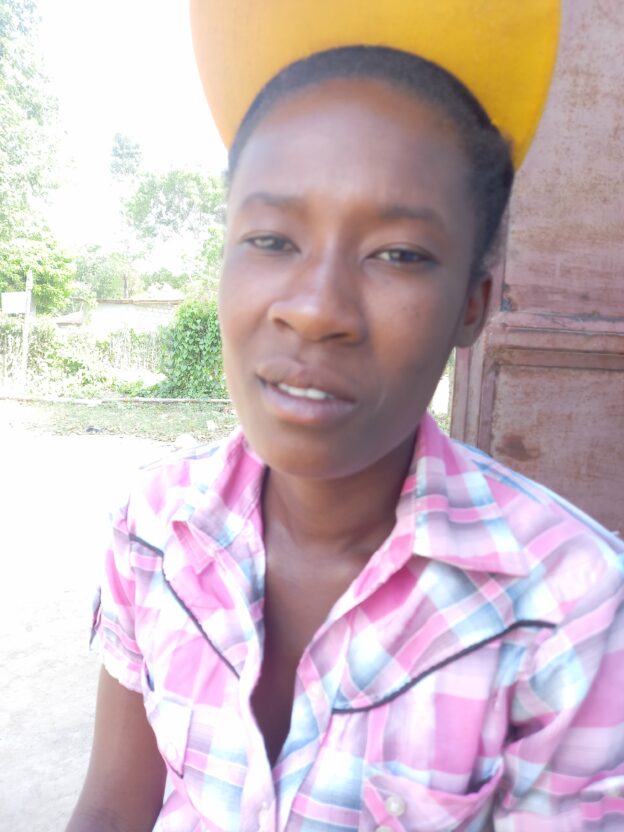Josianne and her partner, Bastien, live with their two young children in Lakòn, in northern Gwomòn. Unable to afford a place of her own, they lived at her mother’s. They got by on earnings from her husband’s day labor and the occasional sale of a bunch of plantains from their garden. “I wouldn’t waste all the money he earned, and we wouldn’t sell food from our garden just to buy other food.”
When she joined the program, she asked CLM to give her goats and small commerce. She received two young female goats, which became five as they had young.
But her real progress has come through small commerce. She initially used the funds the program made available to buy laundry products, like detergent, soap, and bleach. But she soon changed her business. “At our training they said that you shouldn’t stay in a business that doesn’t sell well. Detergent and soap didn’t sell quickly.”
So she came up with another idea. She began buying five-gallon buckets of cooking oil. She would sell gallons, half-gallons, or quarter-gallons to clients on Fridays. Some bought the oil for home use, but several were merchants who made and sold fried snacks at the side of the road. Josianne sells the oil and delivers it on Friday, and clients pay the following week.
The oil business only busied her one day each week, so she eventually added another. She brings cash to the market on Gwomòn’s three market days, and she buys what she finds. Anything she thinks she can turn over quickly. Often she buys in bulk, then selling what she’s purchased in small, retail-sized portions. But she also keeps her eyes open on the way to the market. She sometimes finds people willing to sell for a lower price to save themselves from having to carry their burden all the way. In exchange for the extra effort involved, she can make her trip to the market more profitable.
And she has already been able to buy two additional goats with profit from her businesses, even as she and Bastien were managing their household, investing in their home, and accumulating savings. They purchased the small piece of land that they built their new home on. “We bought it from my father, so it wasn’t expensive.”
She and Bastien have expanded their activities in other ways as well. They have begun buying sugarcane from farmers in their neighborhood. The rent a local mill, where they extract the juice and boil it down to molasses, which sells to producers of local rum. The profitability of this new activity has entered into Josianne’s broader planning. Her savings and loan association’s first annual pay-out is coming up, and she’s already decided that she will use her share to buy the largest male donkey she can afford. It will help her and Bastien move the cane they purchase.
And the couple have larger plans. By caring for their goats, Josianne hopes to eventually have enough that she can sell some of them off to buy a cow, and, once they have a cow, she thinks they can start think of buying more land, like a space to build a larger house on.
